The first time I had to deal with death on the job was Christmas Eve morning 1974. I was only weeks out of training. Death would become my adversary on the street in an almost a daily battle. We fought in the homes of cardiacs, on shooting and stabbing scenes, in car accidents and even baby cribs. He was my enemy. He won a lot more than he lost in our battles. But I won some. It is what the whole thing was about. I had been assigned to Engine 3 out of training. It was a company in a quite residential neighborhood. The station was filled with old timers putting in their last years on the job before retirement. They were uniformly big, loud World War II veterans who had worked 24 hours on and 24 hours off for most of their careers. They all smoked like chimneys and drank like fish. Good men who knew their jobs and had seen it all after twenty five years, men who were happy if we never left the station on a run during a shift. But I was eager for action. I would learn that I did not have to be eager for action, it would find me soon enough. We were into our usual end-of-a-shift morning ritual of sitting around groggily sipping coffee waiting for our relief so we could go home. You cannot leave until your relief is in the station and has his gear on the truck. So you sit there in the kitchen sipping enough coffee to keep awake, just long enough so you could go home and crawl back to bed. I was just trying to balance the caffeine level. The tones came in and the bell went off. The Dispatcher’s voice came over the loud speaker. I ran to the truck as the older guys walked. “Engine 3 woman down.” It was cool beautiful Florida December morning. The Engine was an open cab so the run there was almost pleasant. I grabbed the oxygen kit off the Engine and one of the other firefighters grabbed the first aid kit. The address was the old American Legion Hall a crumbling landmark at the edge of our territory. It was seedy rundown place with small apartments. We moved through a maze of dark halls and dirty apartments until we found our victims apartment. The room was small and dirty. A middle-aged woman lay in the middle of the floor. I knelt beside her while Charlie checked for a pulse and breathing. He shook his head. I tore open her nightgown and put two fingers on zypoid process, then placed the heel of my hand. It stuck me how cold her skin was. The complete limpness was so different than anything I had ever felt in another human being before. Her half closed eyes stared unseeing at the ceiling. She seemed smaller somehow, as if the something that had made her who she was, was gone. The essence of whatever made her had left her body and left it smaller and deflated. It was as if it took up space, and made that person larger, vibrant and whole was gone. That fact in some unconscious way effects you the first time you see it. I thought about what I was supposed to do. Fingers up off the chest so you don’t break ribs. Heel of the hand on the sternum. I was worrying about all of the things I was supposed to worry about. Because that is what I have to worry about. I can’t take in all of these other impressions until later. The later is what is more difficult to deal with, than actual physical action required to perform CPR. I worked very hard to remember all of the things I was supposed to do. One one-thousand. Fingers up off the chest so I don’t break ribs. Two one-thousand. I feel the ribs break anyway. She is very frail. It feels like little pops in her chest with each compression. Three one-thousand. Keep the heels of my hand on her sternum. Four one-thousand. Five one-thousand. I pause for a fraction of second to let Charlie give a breath. One one-thousand. Two one-thousand. Three one-thousand. Four one-thousand. I counted to out loud so Charlie can time the breaths. Five one-thousand. And so it goes as you work. You settle into a rhythm. After a while your back will start to ache. It is a very awkward position. You are leaning over someone without any support. One one-thousand. I can hear the ambulance approaching. “Huder. Check out the other one in the bed.” The Lieutenant said. Other one! What is he talking about? I give up my place to another firefighter and turn to the small bed. There buried beneath the covers is a small woman somewhere in her seventies. Her eyes have the same half open stare as the woman on the floor. I gingerly reach down and place two finger where her carotid pulse should be. She is much colder than the woman on the floor. She is stiff. “She is cold and stiff Lieutenant.” I am stunned. Not one code but two. What in the world happened here? Two women dead. One code was enough, but a code and a dead body together on Christmas Eve morning. We continued the code on the woman on the floor. Since the woman was cold and stiff we did not try and work her. The other firefighter was counting out loud. “One one thousand. Two one thousand. Three one thousand. Four one thousand. Five one thousand.” Charlie gave another breath. And so it went as we waited for the ambulance. I helped around the edges for the rest of the call. I kept glancing over at the women in the bed. Still trying to take it all in. The ambulance arrived and we loaded the patient onto the stretcher. The EMT off the ambulance took over compressions. Charlie rides in to help with the code. A man suddenly shows up looking confused and stunned, apparently one woman was his wife and the other his sister, and both had just died on Christmas Eve. What can you say to someone like that? I wanted to say something but could not begin to think of what. So I moved around and helped carry out equipment back to the truck. We left the scene with the police to take care of the other body and went back to the station. We head back to the station. I ride in the jump seat. So I sit in the sunshine on a beautiful Florida morning with the images of two dead women rolling around in my head. It was introduction to the juxtaposition of death and normality. Of living and dying so close together. I had lived in a protected bubble my whole life until then. I had lost my father and grandparents but not like this. That bubble had burst and now I was aware of how close death was to all of us. I kept thinking about the family. Such a loss on Christmas Eve morning would be staggering. I had seen codes in during my EMT training in the emergency room. I had observed them. I had never participated. What struck me was we did not have the cool sterile environment of the hospital emergency room as protection against the tragedy of it all. We worked in the code in the their bedroom. I saw the second woman in the bed she had gone to sleep in the night before. Their personal belongs surrounded us. The dinginess of their lives had rubbed on me and made me feel their poverty. It was the little realities that were making the experience so personal. The feel of their skin. The feel of her ribs breaking as I did CPR. They said it would happen in training, even when you did it right. But the reality. The little pop you felt is was all very close up. Our relief was waiting and pulled our gear off the truck. I had a cup of coffee and sat at the table in the kitchen. A ritual I would repeat thousands of times over the next years but this was the first time after something that was so changing. We talked about what we were going to do for Christmas, nothing profound, just men getting off work talking to one another before they went home to their families. We told the on coming shift about the call and got a couple of “you have got to be shitty me’s”. They understood. They would just shake their heads; the street always had something up her sleeve to throw you. The ambulance dropped Charlie off. The woman we worked did not make it. The drive home is lost somewhere as I tried to sort through all of the emotions and memories. I felt a huge sense of pride that I had performed well in the face of someone needing my help so desperately. I felt inadequate that I had to struggle mightily with my emotions. I kept remembering the half open eyes. I struggled with the death of two people I had never known but were now such a large part of me. All of these emotions, memories, and impressions swirled around changing my mood as fast as they ran through my head. I had done it. I had gone to a call where lives were on the line and I had performed. There is always the question until you do it. No big call just the first of the thousands of small personal tragedies that I would be a part of over the next years, a small very personal sadness that becomes some small part of you. You were part of someone’s death. You were the last to try and save them.
Friday, December 14, 2007
My First Code
Labels:
emt,
firefighter,
paramedic
Subscribe to:
Post Comments (Atom)
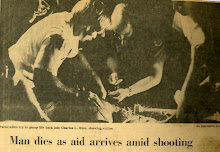

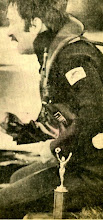
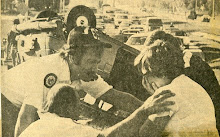
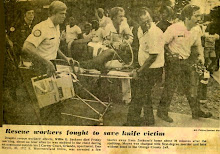
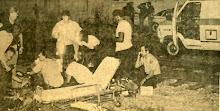

No comments:
Post a Comment